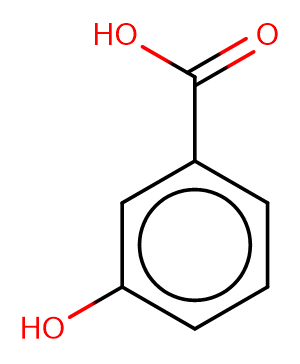
3-Hydroxybenzoic acid
CAS No. 99-06-9
3-Hydroxybenzoic acid( —— )
Catalog No. M19679 CAS No. 99-06-9
Produced in the gut microflora as one of the three main metabolites formed from the catechin diet. Its use in the production of glycol benzoates for the application of plasticizer in adhesive formulations is increasing.
Purity : >98% (HPLC)
 COA
COA
 Datasheet
Datasheet
 HNMR
HNMR
 HPLC
HPLC
 MSDS
MSDS
 Handing Instructions
Handing Instructions
| Size | Price / USD | Stock | Quantity |
| 500MG | 35 | In Stock |


|
| 1G | Get Quote | In Stock |


|
Biological Information
-
Product Name3-Hydroxybenzoic acid
-
NoteResearch use only, not for human use.
-
Brief DescriptionProduced in the gut microflora as one of the three main metabolites formed from the catechin diet. Its use in the production of glycol benzoates for the application of plasticizer in adhesive formulations is increasing.
-
DescriptionProduced in the gut microflora as one of the three main metabolites formed from the catechin diet. Its use in the production of glycol benzoates for the application of plasticizer in adhesive formulations is increasing. It is also used in the manufacture of alkyd resins and drilling mud additive for crude oil recovery applications. It is used as a rubber polymerization activators and retardants.
-
In Vitro——
-
In Vivo——
-
Synonyms——
-
PathwayOthers
-
TargetOther Targets
-
RecptorOthers
-
Research Area——
-
Indication——
Chemical Information
-
CAS Number99-06-9
-
Formula Weight138.12
-
Molecular FormulaC7H6O3
-
Purity>98% (HPLC)
-
SolubilityDMSO:10 mM
-
SMILESOC(=O)c1cccc(O)c1
-
Chemical Name——
Shipping & Storage Information
-
Storage(-20℃)
-
ShippingWith Ice Pack
-
Stability≥ 2 years
Reference
1.Liu J H Smith P C . Direct analysis of salicylic acid salicyl acyl glucuronide salicyluric acid and gentisic acid in human plasma and urine by high-performance liquid chromatography.[J]. J Chromatogr B Biomed Appl 1996 675(1):61-70.
molnova catalog



related products
-
Glyceryl monostearat...
Glyceryl monostearate is an agent of emulsifying.
-
30-Hydroxygambogic a...
30-Hydroxygambogic acid exhibits significant cytotoxicities against the human leukemia K562/S and the corresponding doxorubicin-resistant K562/R cell lines.
-
NADH disodium salt h...
NADH is the reduced form of nicotinamide adenine dinucleotide (NAD) that can donate electrons as part of a reducing reaction. In that process NADH becomes oxidized to produce NAD+. A variety of enzymes use NADH plus H+ to reduce substrates generating NAD+ as well as the reduced product.



 Cart
Cart
 sales@molnova.com
sales@molnova.com


